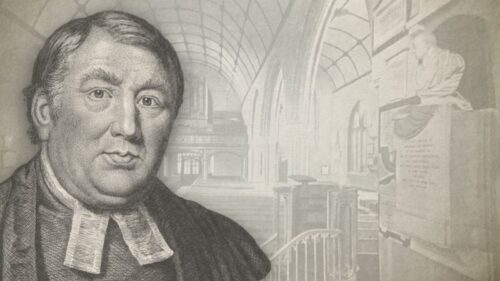
June 21—Morning Devotion
“Men wondered at.”—Zechariah 3:8
Men wondered at indeed, and every redeemed soul may truly say, I am a wonder unto many, a wonder to myself. Oh thou whose name is Wonderful! both thou and the children the Lord hath given thee, are for signs and wonders. Behold, my soul, how it was fulfilled in him whose name was Wonderful, and then thine astonishment will be the less that it should be fulfilled in his followers. I would contemplate thy person, blessed Jesus, and behold thee, not barely wondered at, but despised and rejected of men. The world gazed at thee, but saw no beauty nor form of comeliness in thee to desire thee. In thine offices also, how did the multitude despise thee as a prophet; when blind-folding thee, and smiting thee on thy sacred head, they tauntingly cried out, “Prophecy, thou Christ, who is he that smote thee!’ As a priest, what blasphemy did they utter, when they saw enough to be convinced, and to confess, that thou didst save others, but thyself thou couldst not save. As a King, when having nailed thee to the tree, they demanded a proof of thy power in coming down from the cross. And wert thou not, blessed Jesus, wondered at in thy word, when they acknowledged, “never man spake like this man;” yet charged thy doctrines with blasphemy, and derided thee in them? Wert thou not the wonder and the hatred of the world, when thy miracles astonished them, but were ascribed to the agency of Beelzebub? Weft thou not, O thou spotless Lamb of God, weft thou not charged with immorality and called a wine-bibber, a sabbath-breaker, the friend of publicans and sinners? Did the world thus treat Jesus, and call the Master of the house Beelzebub? Oh then, my soul, well may they so treat them of his household! And must it not be so? Yes. The world knoweth them not, because it knew him not. They are made a spectacle, a gazing-stock, a reproach, a by- word. How unknown in their new birth from God, how little understood in their union with Jesus, how perfectly hidden from the world their life in the Spirit! What an everlasting opposition to carnal men are their pursuits, their pleasures, their happiness, their conversation, their desires—how wondered at their life of faith on the Son of God! They have meat to eat the world knoweth nothing of, for they feed upon the person, body, blood, grace, and righteousness of the Lord Jesus Christ. My soul, hast thou this rarity of charactery Hast thou this blessed singularity? Art thou wondered at because thou runnest not to the same excess of riot, but art blameless and harmless among the sons of God, in the midst of a crooked and perverse generation? Oh blessed, for ever blessed, be his name, who hath called thee to this high, this glorious, this distinguishing honour, of being wondered at and reproached for Jesus’s sake! Yes, Lord, I will not regard the reproach of men, neither be afraid of their revilings, for “the moth shall eat them up like a garment, and the worm shall eat them like wool; but thy righteousness shall be for ever, and thy salvation from generation to generation.”
Robert Hawker (1753-1827) was an Anglican (High-Calvinist) preacher who served as Vicar of Charles Church, Plymouth. John Hazelton wrote of him:
“The prominent features…in Robert Hawker's testimony…was the Person of Christ….Dr. Hawker delighted to speak of his Lord as "My most glorious Christ.” What anxious heart but finds at times in the perusal of the doctor's writings a measure of relief, a softening, and a mellowing? an almost imperceptible yet secret and constraining power in leading out of self and off from the misery and bondage of the flesh into a contemplation of the Person and preciousness of Christ as "the chiefest among ten thousand and the altogether lovely." Christ and Him crucified was emphatically the burden of his song and the keynote of his ministry. He preached his last sermon in Charles Church on March 18th, 1827, and on April 6th he died, after being six years curate and forty-three years vicar of the parish. On the last day of his life he repeated a part of Ephesians 1, from the 6th to the 12th verses, and as he proceeded he enlarged on the verses, but dwelt more fully on these words: "To the praise of His glory Who first trusted in Christ." He paused and asked, "Who first trusted in Christ?" And then made this answer: "It was God the Father Who first trusted in Christ."
Robert Hawker on the Biblical Covenants (Complete)
Robert Hawker's Poor Man's Morning Portions





